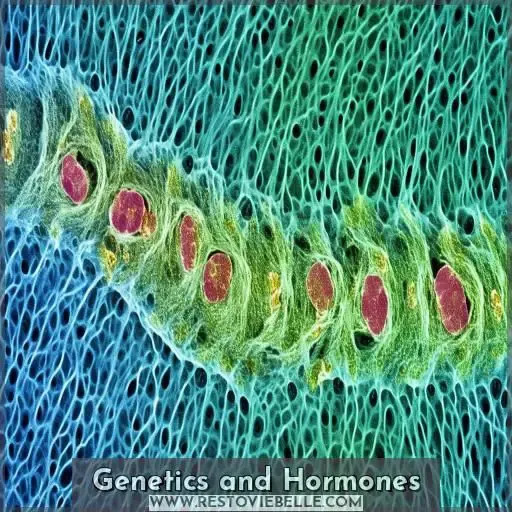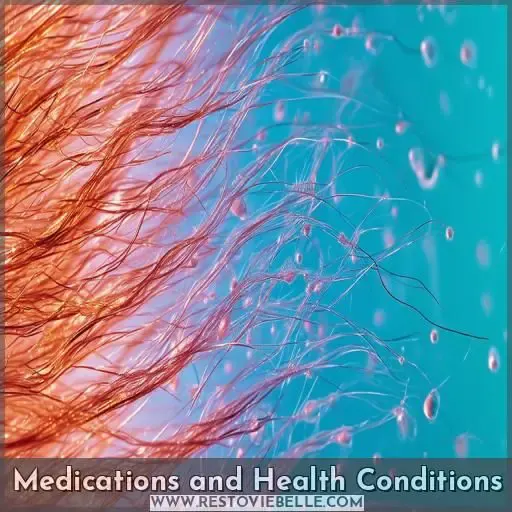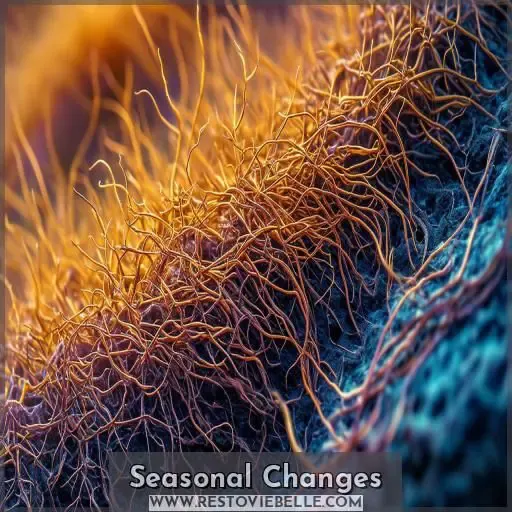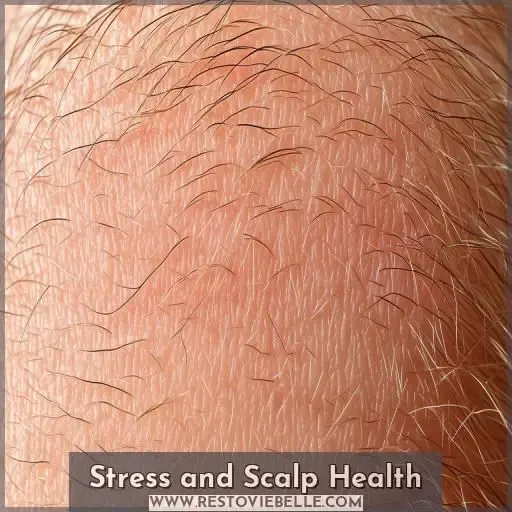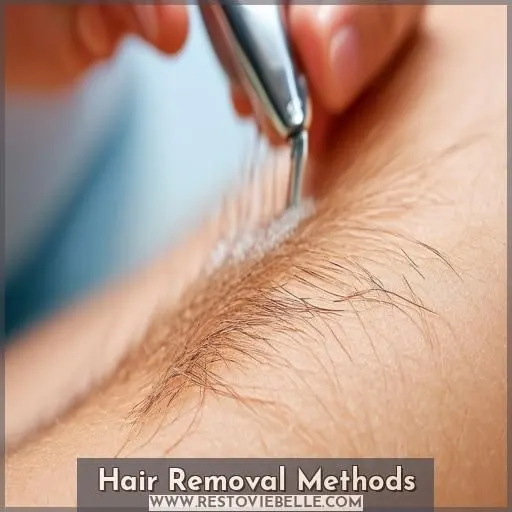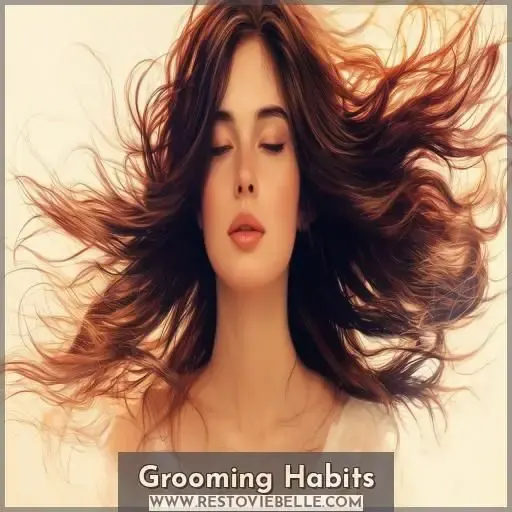This site is supported by our readers. We may earn a commission, at no cost to you, if you purchase through links.
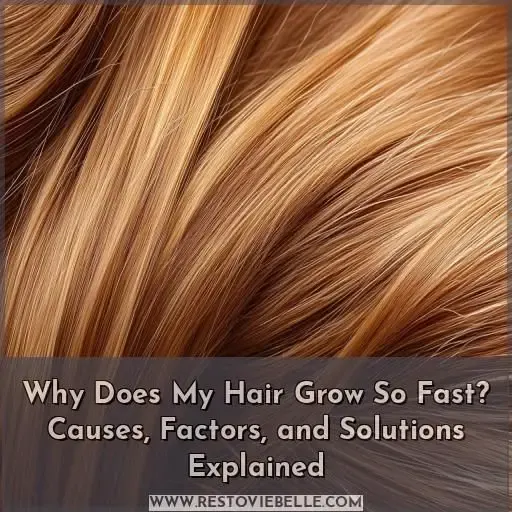 Your hair grows so fast due to a mix of genetic factors, hormones, age, and scalp health.
Your hair grows so fast due to a mix of genetic factors, hormones, age, and scalp health.
If your family has a history of rapid hair growth, you might too. Hormonal imbalances, like excess testosterone, or conditions such as PCOS, can also speed up hair growth.
Hair typically grows fastest between ages 15-30 and can slow down with age. (Source)
Seasonal changes and a healthy scalp play roles as well—longer daylight and good scalp care can boost growth.
Wondering what else affects your hair growth? You’re about to find out.
Table Of Contents
- Key Takeaways
- Why Does My Hair Grow So Fast?
- Genetics and Hormones
- Age and Gender
- Medications and Health Conditions
- Seasonal Changes
- Stress and Scalp Health
- Hair Removal Methods
- Ethnicity and Hair Texture
- Pregnancy and Postpartum
- Grooming Habits
- Frequently Asked Questions (FAQs)
- What does it mean if my hair grows fast?
- Are you healthy if your hair grows fast?
- What causes rapid hair growth?
- Can hair grow 2 inches in a month?
- Does hair color affect growth rate?
- Can hairstyles promote or restrict growth?
- Is hair growth genetic or purely environmental?
- How do haircare products impact growth rate?
- Can diet and exercise influence hair growth?
- Conclusion
Key Takeaways
- Your rapid hair growth might be a genetic gift from your family tree, or it could be the result of hormonal imbalances like excess testosterone or PCOS causing those luscious locks to sprout like wildflowers.
- Just like the seasons, your hair growth cycles through periods of acceleration and deceleration. Embrace the summer of your hair’s life when it’s growing at breakneck speed, fueled by longer days and warmer temperatures.
- While stress can sometimes cause your hair to grow faster, like a wild vine overtaking a garden, maintaining a healthy scalp is the real key to unlocking your hair’s full growth potential.
- Don’t sweat the small stuff like hair removal methods or product buildup – focus on the big picture of nourishing your follicles with a balanced diet, gentle grooming habits, and a stress-free mindset. Your hair will thank you with lush, vibrant growth.
Why Does My Hair Grow So Fast?
Your hair may grow fast due to genetic factors or hormonal imbalances that accelerate growth cycles. Additionally, certain medications, seasonal changes, and scalp health can contribute to rapid hair growth.
Genetics and Hormones
Your rapid hair growth could be attributed to genetic factors that predispose you to fast hair growth and hormonal imbalances, such as excess testosterone levels . Women with polycystic ovary syndrome (PCOS) often experience increased hair growth due to the condition’s impact on hormone levels (Source).
Genetic Predisposition to Fast Hair Growth
Genetics notably influence the rate of hair growth. Factors include:
- Family history of rapid hair growth.
- Genes affecting hair length and texture.
- Variability in scalp health.
- Differences in body hair growth.
- Genetic predisposition to hair damage.
Hormonal Imbalances, Such as Excess Testosterone
Excess testosterone levels may lead to hirsutism, characterized by a rapid hair growth rate. Hormonal imbalance from conditions, such as polycystic ovary syndrome, can intensify this effect. Environmental factors further influence these hormonal changes, exacerbating the hair growth issues.
Polycystic Ovary Syndrome (PCOS) in Women
Polycystic Ovary Syndrome (PCOS) in women can cause a hormonal imbalance, leading to fast body hair growth. This condition affects the menstrual cycle, fertility, and hair texture, resulting in unusually high hair growth rates .
Age and Gender
You’ll notice that your hair grows fastest between the ages of 15 and 30, with male hair typically growing faster than female hair. As you age, hair growth tends to slow down due to changes in hormonal activity and overall health conditions.
Hair Grows Fastest Between Ages 15-30
Hair grows fastest between ages 15-30 due to ideal hormone levels, nutrition, and overall health. To support healthy hair growth during this period:
- Maintain a balanced diet
- Exercise regularly
- Get enough sleep each night
Engage these habits for ideal results.
Male Hair Typically Grows Faster Than Female Hair
Male hair typically grows faster than female hair due to differences in hair density, DHT sensitivity, and androgen receptors. These factors influence facial hair and pubic hair growth, contributing to overall faster growth rates in men.
| Factors | Male Hair | Female Hair |
|---|---|---|
| Hair Density | Higher | Lower |
| DHT Sensitivity | Higher | Lower |
| Androgen Receptors | More Active | Less Active |
| Scalp Microbiome | Robust | Moderate |
| Hair Porosity | Varies | Varies |
Hair Growth Tends to Slow Down With Age
As you age, hair growth tends to slow due to hormonal changes, genetics, and scalp health. Your hair follicles become less active, resulting in reduced hair growth. This decline is natural, affecting overall hair health and appearance.
Medications and Health Conditions
Some medications, like steroids, can impact your hair growth rate, making it faster than normal . Health issues, such as thyroid disorders, along with nutritional imbalances or excess vitamin intake, can also affect how quickly your hair grows .
Side Effects of Certain Medications, Like Steroids
Steroid use can increase hair density and cause scalp irritation. Certain medications, particularly steroids, may alter hair growth depending on dosage. Hair removal methods like waxing or laser can manage unwanted growth, providing alternatives to address these side effects.
Underlying Health Issues, Such as Thyroid Disorders
Medications for thyroid disorders can substantially impact hair growth. Thyroid function influences hair health, with hypo- or hyperthyroidism disrupting follicles and causing abnormal growth. Hormone therapy may stabilize the issue, ensuring balanced hormones for healthier, consistent hair growth.
Nutritional Deficiencies or Excess Vitamin Intake
Nutritional deficiencies or excessive vitamin intake can notably affect hair growth. Consider adjusting your diet first for best results:
- Make sure to get enough protein
- Include essential vitamins and minerals
- Be careful not to take too many supplements
- Talk to a healthcare professional before starting new supplements
Seasonal Changes
Seasonal changes can greatly influence hair growth, often accelerating it during longer daylight hours and warmer temperatures due to increased sunlight exposure and vitamin D production . Hormonal fluctuations influenced by seasonal variations also play a key role in enhancing hair growth rates during specific times of the year .
Hair Growth May Increase During Certain Seasons
Seasonal fluctuations have a substantial impact on hair growth. During specific seasons, particularly in response to environmental changes, such as shifts in temperature and humidity, your hair’s growth rate can accelerate. Researchers highlight these fluctuations as critical hair growth triggers or suppressors, deepening hair growth science .
Longer Daylight Hours and Warmer Temperatures
Seasonal changes, such as longer daylight hours and warmer temperatures, can boost hair growth by increasing the anagen phase of the hair cycle. This phenomenon is due to improved circulation and metabolic activity, enhancing scalp hair health and [vital.] .
Hormonal Fluctuations Influenced by Seasonal Changes
As daylight increases, sunlight exposure affects melatonin production, leading to hormonal fluctuations. These seasonal changes can stimulate hair follicle activity, increasing growth. Conversely, in winter, a lack of Vitamin D can retard hair growth due to hormonal imbalances.
Stress and Scalp Health
Chronic stress can accelerate hair growth by increasing cortisol levels, which impacts your hair follicles . A healthy scalp is essential for ideal hair growth, but excessive shampooing or product buildup can irritate it, leading to potential issues (Source).
Chronic Stress Can Accelerate Hair Growth
Chronic stress triggers cortisol production, which negatively impacts hair follicle development, causing hair growth cycles to accelerate. This can lead to issues such as thinning and ingrown hairs due to increased shedding, debunking the myth that trimming promotes growth.
Healthy Scalp Promotes Optimal Hair Growth
Maintaining a healthy scalp is essential for hair growth. Regular scalp care, including massages and treatments, enhances blood circulation and nourishment, promoting optimal hair growth. Use quality hair products and hair growth enhancers to support a clean, healthy scalp.
Excessive Shampooing or Product Buildup Can Irritate the Scalp
While a healthy scalp promotes ideal hair growth, excessive shampooing or product buildup can irritate your scalp. Common issues include:
- Dandruff
- Dryness
- Over-conditioning
- Hair growth preventers
These problems can be hair growth stoppers, reducing overall health.
Hair Removal Methods
Shaving can make hair appear thicker and coarser, giving the illusion of faster growth. Waxing and plucking may stimulate quicker regrowth, while laser hair removal can provide a more long-term solution by slowing down hair growth over multiple sessions.
Shaving Can Make Hair Appear Thicker and Coarser
Shaving, a common hair removal method, can create the illusion that hair grows back thicker and coarser due to the blunt ends left by the cut.
| Factors to Weigh | Shaving Frequency | Hair Growth Perception | Hair Growth Damagers | Pubic Hair Grooming |
|---|---|---|---|---|
| Daily | Appears Thicker | Frequent Irritation | Common Practice | |
| Weekly | Slight Increase | Follicle Damage | Personal Preference | |
| Monthly | Minimal Change | Mild Stress | Grooming Choice | |
| Sporadically | Natural Look | Less Damage | Occasional |
Waxing and Plucking Can Stimulate Faster Regrowth
Waxing and plucking can often lead to faster hair regrowth due to the stimulation of hair follicles, causing inflammation and scalp irritation. You’ll frequently notice:
- Increased hair follicle damage
- A rise in ingrown hairs
- Potential for hyperpigmentation
Laser Hair Removal May Slow Down Growth Over Time
Laser hair removal may reduce hair growth gradually over time by targeting hair follicles and causing damage, leading to long-term hair reduction. It often requires multiple sessions to achieve desired results, noticeably affecting the overall hair growth rate.
| Hair Removal Method | Effect on Hair Growth |
|---|---|
| Waxing | Stimulates faster regrowth |
| Plucking | Stimulates faster regrowth |
| Laser Hair Removal | Reduces growth, long-term reduction |
Ethnicity and Hair Texture
Your hair texture can considerably influence how quickly it appears to grow; people with coarse, curly hair often notice faster growth, while those with straight, fine hair might feel theirs grows slower. This perception arises from differences in how hair types handle and show length, with curls compacting growth and straight hair extending it visibly.
People With Coarse, Curly Hair May Experience Faster Growth
If you have coarse, curly hair, you might notice it growing rapidly due to its unique texture variations and follicle density. Key factors include:
- Increased hair porosity
- Efficient scalp hydration
- Genetic predisposition
- Environmental influences such as humidity
- High sebaceous gland activity
These elements contribute to the appearance of faster growth in such hair types.
Straight, Fine Hair May Appear to Grow Slower
While coarse, curly hair tends to grow faster, straight, fine hair may appear to grow slower due to its delicate structure and higher breakage potential. Fine hair can easily be damaged by styling and environmental factors, which can stunt its length and make growth less noticeable. Proper care routines are essential to support healthier, faster growth.
Pregnancy and Postpartum
During pregnancy, your hair growth may increase due to elevated estrogen levels, resulting in thicker and fuller hair. However, postpartum, hormonal changes can lead to shedding and thinning as the hair growth cycle returns to its normal pattern.
Hair Growth May Increase During Pregnancy
During pregnancy, you might notice your hair growing faster and thicker due to hormonal changes. Increased estrogen levels prolong the hair growth cycle. Here are some factors contributing to this change:
- Enhanced nutrient absorption
- Reduced stress levels
- Improved blood circulation
- Hormonal surge
Shedding and Thinning May Occur Postpartum
After childbirth, postpartum hair loss is common. Hormonal fluctuations can lead to shedding and thinning. Nutrient deficiencies and scalp irritation may exacerbate this. For hair regrowth, maintaining scalp health is essential.
| Factor | Impact on Hair | Prevention Tips |
|---|---|---|
| Hormonal Changes | Increased Shedding | Balance Hormones |
| Nutrient Deficiency | Weakened Hair | Balanced Diet |
| Scalp Irritation | Hair Loss | Gentle Hair Care |
| Stress Levels | Accelerated Shedding | Stress Management Techniques |
Hormonal Changes Influence Hair Growth Cycles
Hormonal changes during pregnancy and postpartum greatly influence hair growth cycles. Hormonal imbalances and thyroid disorders can cause increased growth or shedding. Seasonal changes and stress levels also affect these cycles. Maintaining good scalp health supports balanced hair growth.
Grooming Habits
To maintain fast-growing hair, focus on grooming habits like regular trimming to remove split ends without stimulating growth, and gentle brushing to distribute natural oils for healthier strands. Protective hairstyles can also help minimize breakage and maintain hair length.
Regular Trims Do Not Stimulate Growth
Regular trims don’t stimulate hair growth. Hair grows from the follicle at the scalp, not the ends. Trimming helps remove split ends, preventing breakage, and maintaining healthy hair. Focus on scalp circulation, hair growth supplements, and nourishing hair growth masks .
Gentle Brushing Can Distribute Natural Oils
While regular trims won’t boost hair growth, brushing your hair gently can help. It distributes natural scalp oils along the hair shafts, promoting hair health and reducing scalp irritation. This practice can be more effective without overusing hair products .
Protective Hairstyles Can Minimize Breakage
Protective hairstyles help minimize breakage by reducing the manipulation and environmental exposure of your hair. This is essential for all hair textures and densities, preserving length, promoting healthy growth, and enhancing product absorption, especially if your scalp is sensitive.
Frequently Asked Questions (FAQs)
What does it mean if my hair grows fast?
If your hair grows fast, it likely means you have an active anagen (growth) phase and healthy hair follicles. Genetics, hormones, and age influence growth rates – embrace your luscious locks!
Are you healthy if your hair grows fast?
Fast hair growth isn’t necessarily an indicator of health; it’s influenced by genetics, hormones, age, and factors like diet and stress levels. If excessive, rapid growth accompanies other symptoms, it’s best to consult a doctor to rule out underlying conditions.
What causes rapid hair growth?
Rapid hair growth can stem from genetics, hormones, or underlying health conditions like thyroid issues. Your diet, age, and stress levels also influence growth rate. Consulting a dermatologist can pinpoint the cause and recommend management strategies.
Can hair grow 2 inches in a month?
Like a lush meadow after rain, hair can surge 2 inches in a month – if conditions are ideal. Rapid growth depends on age, genetics, and healthy follicles thriving in a nourished scalp. While possible, it’s an outlier from the typical half-inch norm.
Does hair color affect growth rate?
No, hair color doesn’t directly impact growth rate. Your follicles contain pigment cells that determine shade, but growth speed depends more on age, hormones, and genetics.
Can hairstyles promote or restrict growth?
Wearing tight hairstyles that pull on your scalp can restrict growth by damaging follicles. However, loose styles that avoid tension allow hair to grow freely and unobstructed.
Is hair growth genetic or purely environmental?
Your hair growth rate is primarily determined by genetics, but environmental factors like age, stress, and nutrition can influence it too. While you can’t control your genes, adopting healthier habits may help optimize your hair’s growth cycle.
How do haircare products impact growth rate?
Oh, how you wish for that wondrous tonic to make your hair grow faster! While products claim to boost growth, their impact is minimal – hair’s inner workings are the real drivers here.
Can diet and exercise influence hair growth?
Yes, a well-balanced diet with protein, vitamins, and minerals can promote healthy hair growth. Regular exercise improves circulation, carrying nutrients to follicles for ideal growth.
Conclusion
Like the strands themselves, why your hair grows so fast is intricately woven.
Genetics, hormones, age, health conditions, and seasonal changes each play a role in determining your hair’s growth rate.
While some factors like ethnicity are innate, staying attuned to scalp health and grooming habits can optimize your hair’s growth potential.
Understanding these influences empowers you to nurture vibrant, thriving locks.

